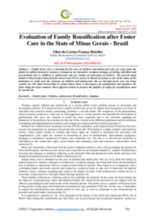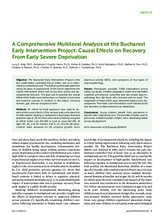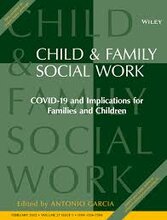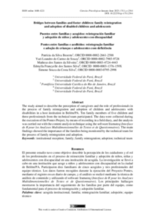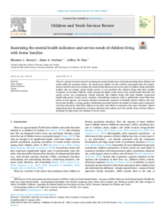Displaying 91 - 100 of 2223
This US-based study explores factors associated with intimate partner violence using longitudinal data from a representative sample of older youth in California Foster Care who participated in the California Youth Transitions to Adulthood Study (CalYOUTH). The authors' IPV outcome measures included victimization, perpetration, bidirectional IPV, and emotional abuse.
This study aimed to brief analyse data from the most recent SUAS census in Brazil, focusing on one of the states of the federation to verify how the referrals of children and adolescents who go through foster care are being carried out. The data showed that in certain places there is discrepancy in reintegration and adoption, the latter being the most common.
Olesea, a 24-year old from Moldova with care experience, shares her story of transitioning from a child care institution to foster care.
The Bucharest Early Intervention Project is the first randomized controlled trial of foster care as an alternative to institutional care. The authors synthesized data from nearly 20 years of assessments of the trial to determine the overall intervention effect size across time points and developmental domains. The goal was to quantify the overall effect of the foster care intervention on children’s outcomes and examine sources of variation in this effect, including domain, age, and sex assigned at birth.
This article looks at the strategies foster care workers employ when dealing with worldview differences between a foster family and the birth family reviewing examples from the Netherlands, Denmark and the US.
This study aimed to describe the perception of caregivers and the role of professionals in the process of family reintegration and adoption of children and adolescents with disabilities in a host institution in Belém/PA, Brazil.
This book chapter highlights the consequences of the recognition of the kafala related to the religious freedom of the immigrant’s family, with a special concern to intergenerational transmission of religious values and the religious education of children in host countries.
This study examined the socioeconomic and demographic drivers of willingness to foster non-kin children among mothers in Nigeria. The findings of this study provide implications for research, social work practice, and education in Nigeria and Africa.
This study utilized a large sample of treatment-seeking children across Ontario to compare children living with a foster family to non-foster children, across a number of psychosocial, care needs, and demographic variables.
Alexander is one of many Ukrainian teenagers who fled to Moldova unaccompanied. Thanks to the partnership between border police, child protection specialists working with UNICEF and local authorities, he was identified and integrated into a foster family from Causeni. Since the onset of the conflict, one of UNICEF's biggest priorities has been to protect children from abuse or trafficking.


